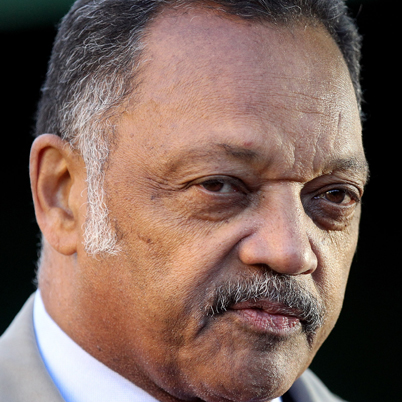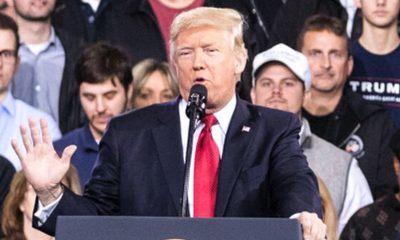Op-Ed
The Chicago Reckoning
By Jesse L. Jackson, Sr.
NNPA Columnist
Why is Chicago Mayor Rahm Emanuel in a neck and neck run-off for re-election? He enjoys national press attention, advertises the endorsement of hometown favorite, President Obama, brandishes a $30 million-plus campaign war chest, largely funded by 100 or so major donors, and mobilizes wall-to-wall advertising and a professional campaign team. Yet he has not only been forced into a run-off, but polls show him still unable to win majority support.
Like any Chicago mayor, Emanuel gets his share of brickbats and insults. He’s said to be insulting and profane, but Chicago prides itself on its feisty politicians. He’s tied to downtown interests, but that has never been a problem.
The reason Emanuel is in trouble is a widespread loss of faith across the city’s Black and Latino neighborhoods. Faith, the Bible tells us, is the “substance of things hoped for, the evidence of things not seen.” Faith is what sustains hope in political leaders even when times are bad. Faith is what makes voters believe that a leader feels their pain, even if he or she does not live in their neighborhoods.
And in large numbers, working families in Chicago, particularly those struggling with low wage jobs that provide no benefits and little security, have lost faith in the man now dubbed the Mayor of the 1 Percent.
What is hoped for and unseen is any plan for neighborhood redevelopment. What is hoped for and unseen is any indication of a strategy for building the economy from the bottom up.
As mayor, Emanuel has focused resources downtown, not on neighborhoods in need. The lights are bright downtown, but the poor neighborhoods live in the shadows. Emanuel shut down 50 neighborhood schools with no community consultation. He waged war on teachers, privatized janitorial services, and too often scorned public employees. Public housing has been shuttered even as private homes are foreclosed. When the schools close, neighborhoods lose resources and hope. Drug stores close; grocery stores close.
The downtown thrives while the neighborhoods continue to decline. As a 2013 study by the Grassroots Collaborative showed, the only one out of four of the jobs created downtown go to Chicagoans. And those few go primarily to residents in majority white neighborhoods, not black or Latino neighborhoods. Massive subsidies don’t begin to touch the people most in need of them.
And as a Chicago Sun Times report revealed, Whites continue to hold a disproportionate number of the highest paying jobs in the administration, particularly those that the mayor controls himself. When the highest paid aides closest to the mayor are White, no matter how dedicated, the concerns of impoverished Black and Latino neighborhoods are not likely to get priority.
Like any good politician, the mayor has reacted as his polls plummeted and his re-election stopped being a sure thing, pushing through an increase in the minimum wage. He’s also worked to extend pre-k and make two years of community college affordable. He’s now touting his Neighborhoods Now program as a development program for seven neighborhoods, but as WBEZ, Chicago Public Radio exposed, the fund is a hodgepodge of private and public projects. In fact, one-fourth of the public money is focused on projects around McCormick Park Convention Center, including two hotels and a big stadium for DePaul – hardly a program for neighborhood reconstruction.
Rahm’s challenger, Jesus “Chuy” Garcia has an underfunded campaign, but a rich message. He has the experience to deal with Chicago’s budget challenges, but he has the commitment to focus on urban reconstruction, on rebuilding neighborhoods, on putting the young to work. Against the odds, he has run a campaign that will take this race down to the wire.
When people lose faith, they lose hope. Sadly, they too often give up on politics. They see no difference between candidates, no reason to vote. The struggle to survive is hard enough. Usually, an incumbent can win re-election with the confidence that many of those who have been abandoned won’t even show up. What is stunning about the rise of challenger Jesus “Chuy” Garcia is the movement behind him – citizens, teachers, organizers, union members, church goers unwilling to succumb to despair, unwilling to assume that nothing can change. That is the real story of the Chicago race. Whatever happens in the April run-off, that movement has given people a reason to believe once more.
Jesse L. Jackson, Sr. is founder and president of the Chicago-based Rainbow PUSH Coalition. You can keep up with his work at www.rainbowpush.org
Advice
COMMENTARY: If You Don’t Want Your ‘Black Card’ Revoked, Watch What You Bring to Holiday Dinners
From Thanksgiving to Christmas to New Year’s Day, whether it’s the dining room table or the bid whist (Spades? Uno, anyone?) table, your card may be in danger.

By Wanda Ravernell
Post Staff
From the fourth week of November to the first week in January, if you are of African descent, but particularly African American, certain violations of cultural etiquette will get your ‘Black card’ revoked.
From Thanksgiving to Christmas to New Year’s Day, whether it’s the dining room table or the bid whist (Spades? Uno, anyone?) table, your card may be in danger.
It could take until Super Bowl Sunday for reinstatement.
I don’t know much about the card table, but for years I was on probation by the ‘Aunties,’ the givers and takers of Black cards.
How I Got into Trouble
It was 1970-something and I was influenced by the health food movement that emerged from the hippie era. A vegetarian (which was then considered sacrilegious by most Black people I knew) prepared me a simple meal: grated cheese over steamed broccoli, lentils, and brown rice.
I introduced the broccoli dish at the Friday night supper with my aunt and grandfather. She pronounced the bright green broccoli undone, but she ate it. (I did not, of course, try brown rice on them.)
I knew that I would be allowed back in the kitchen when she attempted the dish, but the broccoli had been cooked to death. (Y’all remember when ALL vegetables, not just greens, were cooked to mush?)
My Black card, which had been revoked was then reattained because they ate what I prepared and imitated it.
Over the decades, various transgressions have become normalized. I remember when having a smoked turkey neck instead of a ham hock in collard greens was greeted with mumblings and murmurings at both the dining room and card tables. Then came vegan versions with just olive oil (What? No Crisco? No bacon, at least?) and garlic. And now my husband stir fries his collards in a wok.
But No Matter How Things Have Changed…
At holiday meals, there are assigned tasks. Uncle Jack chopped raw onions when needed. Uncle Buddy made the fruit salad for Easter. My mother brought the greens in winter, macaroni salad in summer. Aunt Deanie did the macaroni and cheese, and the great aunts, my deceased grandmother’s sisters, oversaw the preparation of the roast beef, turkey, and ham. My father, if he were present, did the carving.
These designations/assignments were binding agreements that could stand up in a court of law. Do not violate the law of assignments by bringing some other version of a tried-and-true dish, even if you call it a new ‘cheese and noodle item’ to ‘try out.’ The auntie lawgivers know what you are trying to do. It’s called a menu coup d’état, and they are not having it.
The time for experiments is in your own home: your spouse and kids are the Guinea pigs.
My mother’s variation of a classic that I detested from that Sunday to the present was adding crushed pineapple to mashed sweet potatoes. A relative stops by, tries it, and then it can be introduced as an add-on to the standard holiday menu.
My Aunt Vivian’s concoctions from Good Housekeeping or Ladies’ Home Journal magazine also made it to the Black people’s tables all over the country in the form of a green bean casserole.
What Not to Do and How Did It Cross Your Mind?
People are, of all things holy, preparing mac ‘n’ cheese with so much sugar it tastes like custard with noodles in it.
Also showing up in the wrong places: raisins. Raisins have been reported in the stuffing (makes no sense unless it’s in a ‘sweet meats’ dish), in a pan of corn bread, and – heresy in the Black kitchen – the MAC ‘n’ CHEESE.
These are not mere allegations: There is photographic evidence of these Black card violations, but I don’t want to defame witnesses who remained present at the scene of the crimes.
The cook – bless his/her heart – was probably well-meaning, if ignorant. Maybe they got the idea from a social media influencer, much like Aunt Viv got recipes from magazines.
Thankfully, a long-winded blessing of the food at the table can give the wary attendee time to locate the oddity’s place on the table and plan accordingly.
But who knows? Innovation always prevails, for, as the old folks say, ‘waste makes want.’ What if the leftovers were cut up, dipped in breadcrumbs and deep fried? The next day, that dish might make it to the TV tray by the card table.
An older cousin – on her way to being an Auntie – in her bonnet, leggings, T-shirt, and bunny slippers and too tired to object, might try it and like it….
And if she ‘rubs your head’ after eating it, the new dish might be a winner and (Whew!) everybody, thanks God, keeps their Black cards.
Until the next time.
Alameda County
Seth Curry Makes Impressive Debut with the Golden State Warriors
Seth looked comfortable in his new uniform, seamlessly fitting into the Warriors’ offensive and defensive system. He finished the night with an impressive 14 points, becoming one of the team’s top scorers for the game. Seth’s points came in a variety of ways – floaters, spot-up three-pointers, mid-range jumpers, and a handful of aggressive drives that kept the Oklahoma City Thunder defense on its heels.

By Y’Anad Burrell
Tuesday night was anything but ordinary for fans in San Francisco as Seth Curry made his highly anticipated debut as a new member of the Golden State Warriors. Seth didn’t disappoint, delivering a performance that not only showcased his scoring ability but also demonstrated his added value to the team.
At 35, the 12-year NBA veteran on Monday signed a contract to play with the Warriors for the rest of the season.
Seth looked comfortable in his new uniform, seamlessly fitting into the Warriors’ offensive and defensive system. He finished the night with an impressive 14 points, becoming one of the team’s top scorers for the game. Seth’s points came in a variety of ways – floaters, spot-up three-pointers, mid-range jumpers, and a handful of aggressive drives that kept the Oklahoma City Thunder defense on its heels.
One of the most memorable moments of the evening came before Seth even scored his first points. As he checked into the game, the Chase Center erupted into applause, with fans rising to their feet to give the newest Warrior a standing ovation.
The crowd’s reaction was a testament not only to Seth’s reputation as a sharpshooter but also to the excitement he brings to the Warriors. It was clear that fans quickly embraced Seth as one of their own, eager to see what he could bring to the team’s championship aspirations.
Warriors’ superstar Steph Curry – Seth’s brother – did not play due to an injury. One could only imagine what it would be like if the Curry brothers were on the court together. Magic in the making.
Seth’s debut proved to be a turning point for the Warriors. Not only did he contribute on the scoreboard, but he also brought a sense of confidence and composure to the floor.
While their loss last night, OKC 124 – GSW 112, Seth’s impact was a game-changer and there’s more yet to come. Beyond statistics, it was clear that Seth’s presence elevated the team’s performance, giving the Warriors a new force as they look to make a deep playoff run.
Activism
Essay: Intentional Self Care and Community Connections Can Improve Our Wellbeing
At the deepest and also most expansive level of reality, we are all part of the same being, our bodies made from the minerals of the earth, our spirits infused by the spiritual breath that animates the universe. Willingness to move more deeply into fear and pain is the first step toward moving into a larger consciousness. Willingness to move beyond the delusion of our separateness can show us new ways of working and living together.

By Dr. Lorraine Bonner, Special to California Black Media Partners
I went to a medical school that was steeped in the principles of classical Western medicine. However, I also learned mindfulness meditation during that time, which opened me to the multifaceted relationship between illnesses and the interconnecting environmental, mental and emotional realities that can impact an individual’s health.
Therefore, when I began to practice medicine, I also pursued training in hypnosis, relaxation techniques, meditation, and guided imagery, to bring a mind-body focus to my work in medical care and prevention.
The people I saw in my practice had a mix of problems, including high blood pressure, diabetes, and a variety of pain issues. I taught almost everyone relaxation breathing and made some general relaxation tapes. To anyone willing, I offered guided imagery.
“My work embraced an approach to wellness I call “Liberatory Health” — one that not only addresses the treatment and management of disease symptoms but also seeks to dismantle the conditions that make people sick in the first place.”
From my perspective, illness is only the outermost manifestation of our efforts to cope, often fueled by addictions such as sugar, tobacco, or alcohol, shackled by an individualistic cult belief that we have only ourselves to blame for our suffering.
At the deepest and also most expansive level of reality, we are all part of the same being, our bodies made from the minerals of the earth, our spirits infused by the spiritual breath that animates the universe. Willingness to move more deeply into fear and pain is the first step toward moving into a larger consciousness. Willingness to move beyond the delusion of our separateness can show us new ways of working and living together.
To put these ideas into practical form, I would quote the immortal Mr. Rogers: “Find the helpers.” There are already people in every community working for liberation. Some of them are running for office, others are giving food to those who need it. Some are volunteering in schools, libraries or hospitals. Some are studying liberation movements, or are working in urban or community gardens, or learning to practice restorative and transformative justice, or creating liberation art, music, dance, theater or writing. Some are mentoring high schoolers or apprenticing young people in a trade. There are many places where compassionate humans are finding other humans and working together for a better world.
A more compassionate world is possible, one in which we will all enjoy better health. Creating it will make us healthier, too.
In community, we are strong. Recognizing denial and overcoming the fragmenting effects of spiritual disorder offer us a path to liberation and true health.
Good health and well-being are the collective rights of all people!
About the Author
Dr. Lorraine Bonner is a retired physician. She is also a sculptor who works in clay, exploring issues of trust, trustworthiness and exploitation, as well as visions of a better world.
-

 #NNPA BlackPress4 weeks ago
#NNPA BlackPress4 weeks agoLIHEAP Funds Released After Weeks of Delay as States and the District Rush to Protect Households from the Cold
-

 Alameda County3 weeks ago
Alameda County3 weeks agoSeth Curry Makes Impressive Debut with the Golden State Warriors
-

 Activism4 weeks ago
Activism4 weeks agoOakland Post: Week of November 26 – December 2, 2025
-

 #NNPA BlackPress4 weeks ago
#NNPA BlackPress4 weeks agoSeven Steps to Help Your Child Build Meaningful Connections
-

 #NNPA BlackPress4 weeks ago
#NNPA BlackPress4 weeks agoSeven Steps to Help Your Child Build Meaningful Connections
-

 #NNPA BlackPress4 weeks ago
#NNPA BlackPress4 weeks agoTrinidad and Tobago – Prime Minister Confirms U.S. Marines Working on Tobago Radar System
-

 #NNPA BlackPress4 weeks ago
#NNPA BlackPress4 weeks agoTeens Reject Today’s News as Trump Intensifies His Assault on the Press
-

 #NNPA BlackPress4 weeks ago
#NNPA BlackPress4 weeks agoThanksgiving Celebrated Across the Tri-State






















































